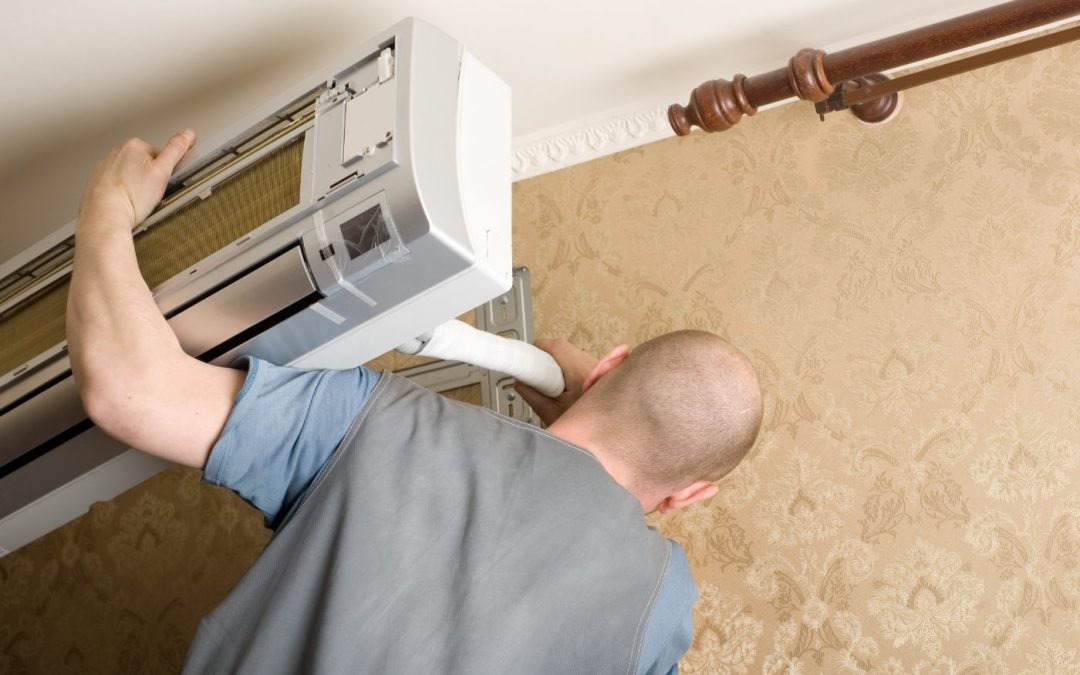Before Installation:
· System Type:
Choosing the appropriate system type for your needs is one of the most important tasks before installing an air conditioner. Window units, split systems, central air conditioning, and portable types are among the available options. The decision is influenced by a number of variables, including your budget, the space’s size, and energy efficiency standards. Larger homes may need central air conditioning for consistent cooling, while smaller spaces might benefit from window units or split systems.
· Size:
Determining the air conditioner’s proper size is equally crucial. An inadequately sized system will have trouble cooling the area, resulting in increased wear and expensive energy expenses. On the other hand, an enormous unit can cool the space too rapidly without adequately dehumidifying the air, which would be inconvenient and ineffective. It is strongly advised to consult an HVAC specialist to determine the cooling load based on the room’s dimensions, ceiling height, insulation, and environment. Precise sizing guarantees the system’s longevity and optimal performance.
· Location:
Another crucial factor to take into account is where the air conditioner is located. Proper placement of window or split units guarantees the best possible ventilation and cooling efficiency. To avoid overheating and save energy, split system outside units should be positioned in a shaded region. For even cooling and simple maintenance, make sure the interior unit is placed away from heat sources, direct sunshine, and obstructions. To prevent inefficiencies, the central system duct and vent location must be carefully planned.
· Energy Efficiency:
Before installation, energy efficiency is a crucial consideration. Seek out systems that have earned an Energy Star certification or a high SEER (Seasonal Energy Efficiency Ratio) rating. These ratings show how well the system cools while using the least amount of energy. High-efficiency systems are more expensive initially, but they save a lot of money on electricity costs over time and are better for the environment.
· Setting Up:
Setting up the area is another pre-installation factor to take into account. Make sure there are no barriers in the way of the experts installing by clearing the area. If electrical work is required, be sure the circuit breaker and wiring in your house can handle the power demands of the air conditioner. To avoid overloads or short circuits, it’s a good idea to have a qualified electrician inspect your electrical system and, if required, upgrade it.
While Installing:
Only certified HVAC specialists should perform the actual installation procedure. DIY installation attempts may result in unsafe conditions, void warranties, or incorrect setup. Professionals are qualified to install the system appropriately, guaranteeing that it conforms with local building requirements and manufacturer specifications. During the installation, be there to ask questions, make sure the location suits your needs, and make sure the system is operating properly.
To make sure everything is functioning properly, specialists will also verify the electrical connections, ventilation, and refrigerant levels throughout the installation. In order to prevent performance problems later on, this step is essential. To ensure you can use the system efficiently, make sure the installer shows you how to use its controls and functions.
Following Installation:
· Routine Maintenance:
For the air conditioner to continue operating well after installation, appropriate care and maintenance are crucial. Get acquainted with the system’s warranty terms and user manual beforehand. In the event that additional repairs or replacements are required, make sure you activate the warranty with the manufacturer.
One of the easiest yet most efficient maintenance procedures is routinely cleaning the air filters. Filters that are dirty can strain the system, decrease airflow, and use more energy. Filters should be cleaned or replaced every one to three months, depending on the type of air conditioner and how often it is used. To avoid dust accumulation and enhance air quality, remember to clean or check the ductwork regularly for central systems.
· Yearly Maintenance:
Setting up yearly expert maintenance for your air conditioner is also crucial. Technicians will examine and clean the parts, measure the amount of refrigerant, and look for any possible problems during a maintenance check. By taking preventative upkeep, the system is guaranteed to function effectively and future expensive repairs are avoided. Ignoring maintenance might reduce the system’s lifespan and cause performance to deteriorate.
· Precautions Against Harm:
Take precautions against external harm to the outside unit. To prevent airflow obstructions, remove any dirt, leaves, or debris that may have accumulated around the device. To protect the unit from severe weather or unintentional damage without compromising airflow, if at all possible, add a protective cover or fence.
· Learn Proper Operation of AC:
Lastly, teach everyone in your home or place of employment how to operate the air conditioner correctly. By leaving windows and doors open or lowering the thermostat too much, you can overload the system and raise energy expenses. To preserve efficiency and comfort, promote careful use.
Frequently Asked Questions:
1. How Frequently Should My Air Conditioner Be Serviced?
It is advised to get your air conditioner serviced at least once a year, ideally before the summer, to guarantee peak performance. Cleaning filters, monitoring refrigerant levels, examining coils, and making sure the system runs well are all part of routine maintenance. The unit’s lifespan is increased and cooling performance is enhanced with yearly repair.
2. How Can I Increase the Efficiency of My Air Conditioner?
The efficiency of your air conditioner can be increased in a number of ways. Monthly air filter cleaning or replacement guarantees enough airflow and lessens system stress. Cool air can be kept from leaving by caulking air leaks around windows and doors.


